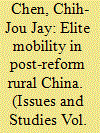|
|
|
Sort Order |
|
|
|
Items / Page
|
|
|
|
|
|
|
| Srl | Item |
| 1 |
ID:
073456


|
|
|
| 2 |
ID:
180686


|
|
|
|
|
| Summary/Abstract |
Studies abound on international migration and remittances across the world and studies are particularly not lacking on the subject in Africa. There are however few studies on the moderating roles of information communication technology (ICT) and social media in the relationships among international migration, remittances and relationships in Sub-Saharan Africa. This article examines the dimension of ICT and social media in migration studies. This is an aspect that has often been ignored and overlooked even though ICT and social media have great contributions in the international migration process particularly as migrants and relatives in sending and receiving countries both have the primary experience. Research objectives include: reasons for emigration; information technology/social media used by migrants and their kin as they relate across spaces; and how ICT affects relationships of kin and international migrants. Secondary data were gathered through journals, books, documents and reliable Internet sources. Primary data were gathered in Ibadan, Nigeria in 2018 through 30 in-depth interviews analysed through content analysis. Findings reveal the nature of ICT used by international migrants and their kin and purpose of utilization and the effects of ICT on international migration, remittances and kinship networks. The article presents detailed data, narratives, interpretations and implications of relationships among international migration, ICT/social media and kinship networks. This article argues that ICT/social media is central to international migration decision-making, access of migrants and kin to social forces and factors motivating international migration, and it is very important to how migrants and kin maintain and/or weaken relationships and access to remittances and utilization.
|
|
|
|
|
|
|
|
|
|
|
|
|
|
|
|
| 3 |
ID:
162516


|
|
|
|
|
| Summary/Abstract |
While rumors predominate in conflict settings, researchers have not identified whether and why they influence the start of organized armed conflict. In this paper, we advance a new conceptualization of initial rebel group formation that aims to do so. We present a simple game-theoretic network model to show why the structure of trusted communication networks among civilians where rebel groups form—which carry credible rumors about the rebels—can influence whether incipient rebels become viable. We argue further that in rural Sub-Saharan Africa, kinship network structures favorable to nascent rebels often underlie ethnically homogeneous localities, but not heterogeneous ones. In doing so, we advance a new explanation for why ethnicity influences conflict onset, and show why ethnic grievances may not be a necessary condition for the emergence of “ethnic rebellion.” We illustrate our arguments using new evidence from Uganda that provides a rare window into rebel group formation.
|
|
|
|
|
|
|
|
|
|
|
|
|
|
|
|
| 4 |
ID:
096243


|
|
|
|
|
| Publication |
2010.
|
| Summary/Abstract |
This article addresses orientations towards place and opportunities for rural-urban and inter-regional migration amongst graduates of vocational colleges in Ul'yanovsk Oblast'. Given the inaccessibility of the housing market and decline in the provision of student and workplace accommodation, kinship networks have become the principal means to negotiate any form of migration. However, while in some cases such networks provide 'bridges' to opportunities elsewhere, a general lack of networks, alongside the 'bonding' effects of kinship networks at the local level, acts as a significant constraint on young peoples' prospects for geographical, and social, mobility.
|
|
|
|
|
|
|
|
|
|
|
|
|
|
|
|
|
|
|
|
|